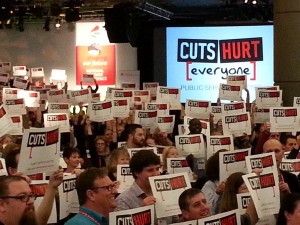The Essential Report Archive Read the latest report
Cuts Hurt–Everyone Part II
Yesterday, Cuts Hurt took its first step publicly to paint the real picture of the devastation underway because of the cuts unleashed on the people by Liberal state premiers. Yesterday, we explained that those cuts hurt everyone. It’s worth another closer look today.
One way of thinking about this is comparing the actual cuts to the what those cuts actually mean in the your daily life and the lives of the hard-working people in the public sector.
 First, the cuts, per the Community and Public Sector Union (CPSU) :
First, the cuts, per the Community and Public Sector Union (CPSU) :
Staff reductions or voluntary redundancies have been announced in about 40 agencies
including:
• Department of Human Services (includes Centrelink, Medicare & CSA) = 521
• Department of Health and Ageing = 378
• Department of Education Employment and Workplace Relations = 500
• Department of Foreign Affairs and Trade = 150
• Department of Climate Change and Energy Efficiency = 300
• Australian Bureau of Statistics = 121
• Department of Veterans Affairs = 46
• Attorney Generals Department = 130
• Department of Agriculture, Fisheries and Forestry = 111
• Department of Resources Energy and Tourism = 100
• Treasury = 217
• Fair Work Ombudsman = 70
• Commonwealth Ombudsman = 35
• Regional Australia = 220
• Prime Minister and Cabinet = 40.
And, then, the impact, per the CPSU:
What has been the impact on services so far?
• The number of outstanding DHS debts has blown out to 300,000
• Some DHS customers now wait 26 days for follow up appointments, this used to be 14 days
• Waiting times in DHS office are now very often over one hour
• Cuts in DHS regional office management has resulted in administrative confusion, including
no responsibility for health and safety issues, lack of basic office supplies so that staff hide
stationery for their team, and staff cleaning tea towels for a whole building as there are no
contracted services.
• Some DHS programs have been told to divert all calls to voice mail and only respond to email
queries resulting in frustration for staff committed to helping their communities
• Baby Bonus claims should be processed in 21 days, some now take 70 days
• DHS call centre waiting times have blown out from two minutes to more than 30 minutes
• Student claims processing are regularly exceeding their 21 day target
• Family Payments claim backlog has jumped from 30,000 to 70,000 and it now take 22 days
to process a claim
• Security guards have been put in 70 DHS offices (at a cost of $7 million over 18 months) to
counter a rise in aggression, violence and anger from welfare recipients
• Quarantine cutting sniffer dog screening at airports
• Once staffing numbers drop below a certain level, Customs district offices may not have
enough people to safely perform their duties. Similarly, declining staff numbers will makes
shift-work difficult which means that on some days, vessels may not be boarded after 5pm
• Veterans now have to wait 40 days for pension increases to be processed
• Customs budget was cut by $34 million in 2011. This meant the loss of 77 front line staff
causing a peak wait time of increase of up to 24 minutes at Sydney, Brisbane, Melbourne
and Perth airports. At the same time, passenger arrives are set to increase by 4.5% a year
over the next 10 years
• Fair Work Australia is going to close its call centre with no plan for how these calls will be
handled by the organisation
• The Australian National Maritime Museum sold a number of vessels in its working vessel
fleet as a saving exercise. This included the historic tugboat Bareki. They now hire another
tugboat
• The Bureau of Meteorology announced it will not back fill positions when people are on
leave. This creates increased workloads for when people return from leave and will
encourage some people to work when on leave
• Cultural Institutions: the ongoing 1.5% efficiency dividend and capital expenditure cuts have
lead to major problems at Screen Australia, the National Museum, the War Memorial, Old
Parliament House; the National Film and Sound Archive, the National Archives, The
Australian Institute of Aboriginal and Torres Strait Islander Studies, the National Library and
the National Maritime Museum. Two major exhibitions planned for the National Gallery
have been postponed, including the internationally significant National Aboriginal triennial.
So, that’s one way of looking at the direct connection between cuts and services.